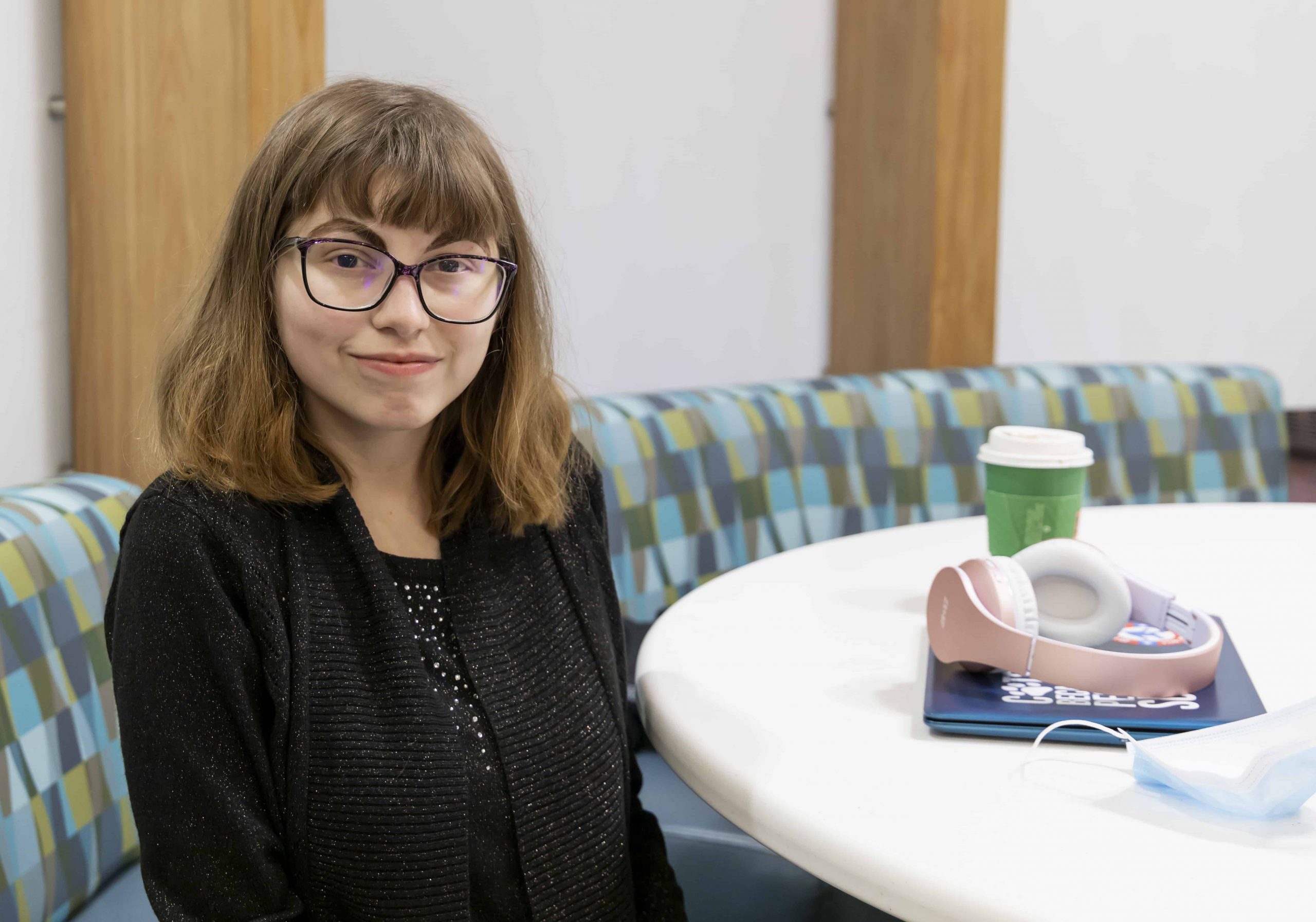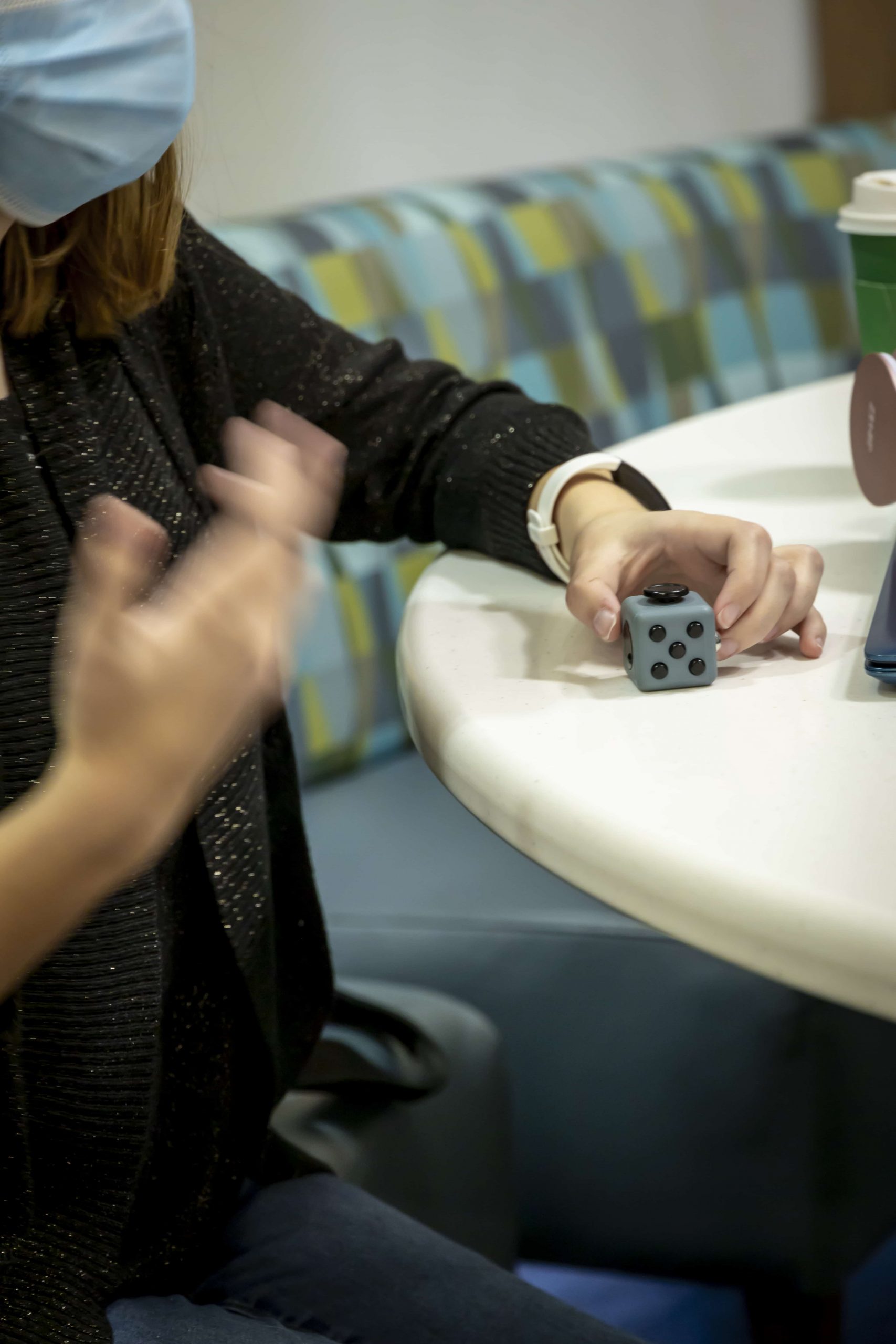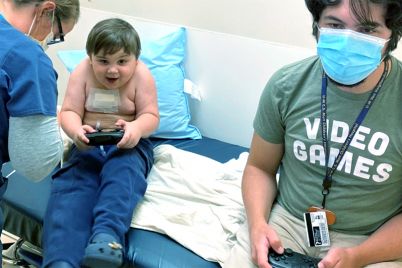
Katherine Farr, a first-year WCC student with ADHD, poses for a photo. Shelby Beaty | Washtenaw Voice
by RUBY GO
Staff Writer
People do all sorts of things on the first floor of the Student Center. Many students use it as a place to grab some lunch while they study. Others like to sit back and chat with friends. Occasionally, a few students even attempt to play basketball.
But Katherine Farr sits alone, in silence, and fidgets with a toy.
“So many people think I’m being childish, like, ‘why are you still playing with toys?’ They don’t understand that it’s because it helps to have something in my hands,” Farr said. “It’s my way of focusing.”

Farr uses a toy, known as a fidget cube, while being interviewed. Fidget cubes (and other fidget toys) were originally designed to help those with ADHD, although they have since become popular among those without disabilities. Shelby Beaty | Washtenaw Voice
Farr, who is diagnosed with attention deficit hyperactivity disorder (ADHD), struggles with depression and frequent panic attacks, both of which often coincide with ADHD. Prior to receiving medication, she was having panic attacks multiple times a day. Now, the panic attacks have reduced to a few times a week, and having something to fidget with helps Farr to calm down. Before being properly diagnosed with ADHD when she was 17, neither Farr nor her parents suspected that she had the disability. It wasn’t until Farr saw a Facebook post about ADHD that she began to question if she had it.
“I was reading through (the post) and I was like, ‘hey, this sounds a lot like me.’ So I got in touch with a therapist, and they said, ‘yea, you probably have ADHD,’” Farr said.
It is estimated that between 2 and 8% of American college students have been diagnosed with ADHD, according to the U.S. National Library of Medicine. However, that estimate is mainly based on studies that only obtained self-reported symptoms of the disorder rather than information from comprehensive evaluations. There is, however, ample evidence that suggests that college students with ADHD are less confident in their ability to succeed compared to their peers.
“I know, intellectually, I’m just as valuable as anyone else, but depression brain says, ‘you broken,’” Farr said.
Despite exhibiting telltale signs of ADHD during childhood, Farr says her teachers were quick to blame her academic struggles on mere laziness, and she was an easy target for bullying amongst her peers.
The bullying got to be so bad that Farr dropped out of school in the tenth grade to do homeschooling, which made a significant difference. She mainly used Khan Academy, which allowed her to do things at her own pace and not be distracted by the noises of other students.
“I got to do things the way my brain worked,” she said.
Farr says she has not experienced any bullying now that she’s at WCC. Instead, her biggest struggle has been managing the workload of the classes. A short attention span is the primary symptom of ADHD, which, for obvious reasons, makes it harder to carry out tasks that many people may take for granted.
“I just don’t have the focus for assignments. I’ll type one sentence for an essay, get distracted for an hour, edit that sentence, (and then) I’ll get distracted again,” Farr said.
When she applied to WCC, Farr wanted to have notes taken for her during class, which is one of the accommodations provided by Learning Support Services (LSS). She says she has a hard time concentrating on what the teacher is saying while simultaneously taking notes. She contacted LSS about getting a note-taker and was led to believe that it was a done deal. However, two weeks into the fall semester, she still hadn’t heard back from LSS with an update.
“They eventually called me back, like, ‘oh, sorry, you’re actually not eligible (to have a note-taker). We can let you record lectures so you can take notes at home, though,’” Farr said. “I don’t have the time or energy for that.”
Determining eligibility for learning accommodations is a very case-by-case process, said LSS Director Debra Guerrero. Only the program specialist assigned to the student determines their eligibility for accommodations.
“There aren’t really any specific rules,” Guerrero said. “Students should ask their program specialist about why they weren’t eligible for an accommodation.”
In addition to being allowed to record lectures, Farr also gets extended time on exams, but she says having a note-taker would best help her manage life between work and school. Although she still lives with her parents, they are not able to pay for her tuition, which is why she has to work. As a McDonald’s employee, Farr says the work she does feels “useless,” which isn’t the hardest part.
“It just takes so much energy. You have to focus on all these different things at once,” Farr said. “For me, that’s actually a big deal.”
At first, Farr tried to apply for one of WCC’s disability scholarships, worth $500, but she was not eligible because she does not live in Washtenaw County, which is one of the requirements of the scholarship. However, if not many students applied for the scholarship, LSS has contacted the association that awards the scholarship and asked for permission to award it to students outside of Washtenaw County, according to Guerrero. However, this year, Guerrero says that all of the scholarship money has been awarded.
“We want students with learning disabilities to come out and talk to us to figure out how we can help accommodate them,” Guerrero said.
This is Farr’s second semester at WCC, and she is currently studying environmental science. While she acknowledges the setbacks of having ADHD, she remains determined to fight for her future.
“It might take me longer than most people, but I want to prove myself,” Farr said.


